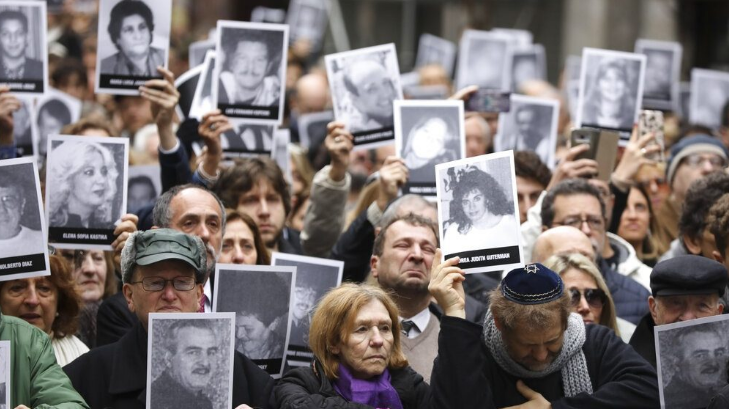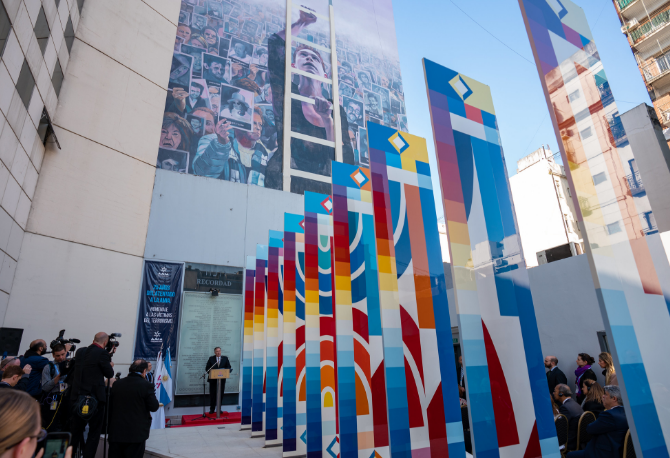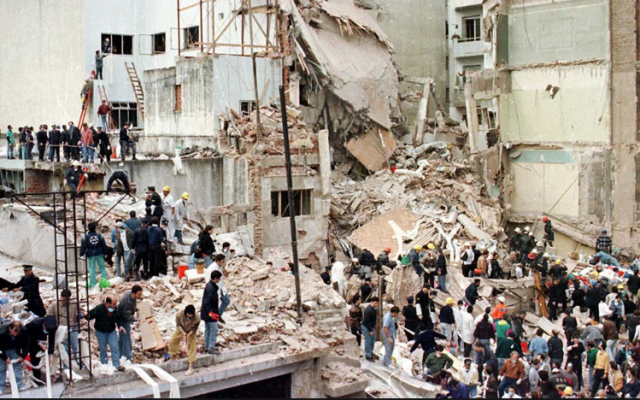Tragedy in Buenos Aires Remembered 25 Years Later
It was just over 25 years ago that a Renault van packed with explosives was detonated in front of the headquarters of the most important Jewish organization in Argentina.
It was just over 25 years ago, on July 18, 1994, that a Renault van packed with more than 600 pounds of high explosives was detonated in front of the headquarters of the most important Jewish organization in Argentina. The blast destroyed the Asociacion Mutual Israelita Argentina, killing 85, most of them Jews working in the building, and wounding more than 300. It was the largest terrorist attack in that country’s history.
Among those who were eyewitnesses to that tragedy were Rabbis Analia Bortz and Mario Karpuj of Congregation Or Hadash in Sandy Springs. In 1994 they had just been ordained by the Conservative seminary in the South American city.
For them both there are still deep emotional memories of that experience.
“It is a scar and a wound that is still open,” Rabbi Bortz said. “But we in Atlanta need to be aware and educated and prepared for a situation like this one. That is the story of AMIA.”
The rabbis and their synagogue are sponsoring a program about that tragic event Aug. 11. The evening is being co-sponsored by the American Jewish Committee Argentina’s consulate in Atlanta.
Rabbi Bortz, her husband and Buenos Aires’ other rabbis had the sorrowful task of comforting the families of the victims. It was a particularly painful task for Bortz, who, because of her training as a doctor, spent three weeks with her husband in the city’s morgue, where the families went to identify their loved ones.
“And so, we would bring the families and it was particularly difficult because often there was not too much to identify because of the force of the bomb. Sometimes the only identification that we found was through their DNA of their teeth. And that was a terrible, terrible time for us.”

Often the remains of the dead were so scant that the caskets had to be filled with rocks to give them some weight as they were carried to the gravesite. Not until 2016 was the last person who died in the explosion identified.
Among the victims was one of Rabbi Bortz’s best friends, Suzi Kleiman, who was married to a rabbi. So strong was the blast that it took eight days of searching through the rubble to find her body.
“They brought in a little boy, too. His name was Sebastian Barreiro, and he wasn’t Jewish. He was 5. He and his mother were walking by the building, holding hands, and the blast just sucked them in.”
The blast in 1994 was the second major attack on Jews in Buenos Aires in the 1990s. In 1992, an explosion ripped through Israel’s embassy there, killing 29 persons and wounding another 242.
Both explosions were the work of the Lebanese terrorist organization, Hezbollah, with the active support of Iran’s Revolutionary Guard and the Iranian embassy in Argentina.
Twenty-five years later, the perpetrators of the AMIA bombing have not yet been brought to justice. There are six Red Notices issued by Interpol, the international law enforcement organization, for the arrest of senior Iranian officials and Hezbollah members suspected of participating in the attack.

In years past the government of Argentina has been accused of corruption and mismanagement in the investigation of the case. Beginning in 2004, a local prosecutor and a member of Argentina’s Jewish community, Alberto Nisman, took over the investigation. Despite death threats against him and his children, he continued the investigation for 11 years. The day before he was to present his final report he was murdered in 2015. Government officials called it a suicide.
“In 1994, after the bombing, Mario and I decided that we would leave Argentina for good because we felt that justice would never be achieved. Unfortunately, we were proved right. For a long, long time nothing happened.”
Perhaps that may be changing. Last month, on the 25th anniversary of the bombing, U.S. Secretary of State Mike Pompeo visited Buenos Aires for an anti-terrorism conference, where Argentina’s government became the first South American country to single out Hezbollah as a global terrorism organization.
The 25th Anniversary Commemoration of the AMIA Bombing will be held 6:30 to 8 p.m. Aug. 11 at Congregation Or Hadash, 7460 Trowbridge Road, Sandy Springs.




comments